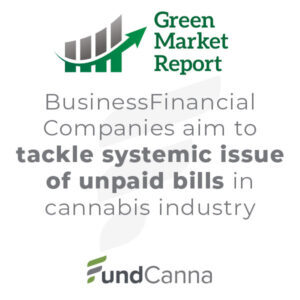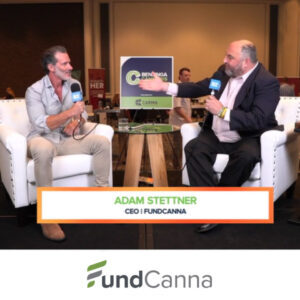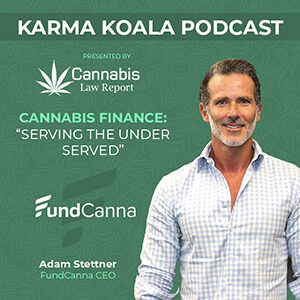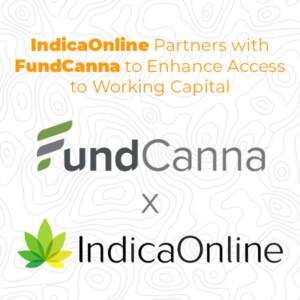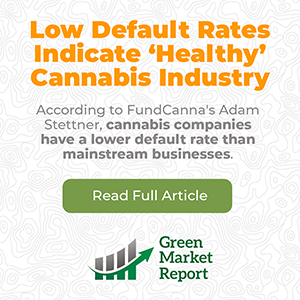FundCanna CEO Adam Stettner recently joined Katan Associates Partner, and Cannabis Industry deal-maker extraordinaire Seth Yakatan, and Henry Miller, VP of Originations at Pelorus Capital for the 'Titans of Finance' webinar hosted by Benzinga.
In the webinar below, the panelists drop a ton of valuable Cannabis Funding Information.
Give it a watch!
Transcript:
Moderated by:
Pato Liddle - Benzinga
Nico Rodriguez - Benzinga
And we are live. Hello, everyone, and welcome back to Cannabis Insider. I'm Pato Little, joined by my fantastic co-host Nico Rodriguez, and we are really thrilled to have you with us today for a special edition of Cannabis Insider. Thanks to our partners, we are kicking off our first ever B2B webinar series dedicated to the cannabis industry.
That's right. Hello everyone. Today we have special guests. Whether you're a cultivator or you're in distribution, you're a retailer, you're looking to expand or, buys or access to more, market cap, whatever you're looking for in terms of finance, today's the day.
And I think it's very important to know that this isn't just another Benzinga event here at Benzinga, we're truly on tour. I can say, with our coverage, on the federal and state cannabis markets, we have our spotlights, for state specific cannabis events and investing more resources in the sector than anyone else. So today's webinar is a part of that larger journey bringing more to you after hosting some of the biggest and most impactful, cannabis events in the industry.
That's right. World doubling down, you know, huge country and a lot to cover. We have consolidated markets, emerging markets. We have the needs of entrepreneurs, cultivators, huge industry that is still in development, supply chain and a lot of different needs and opportunities out there. So, you want to tell us who's joining us today? Who are, the experts?
Of course, sir, we have a huge panel today of experts in Cannabis Financing. We have Adam Stettner of FundCanna, a pioneer in providing tailored financial solutions in the cannabis industry, who will share his insights on access to capital and liquidity challenges. Also, we will be talking with Seth Yakatan of Katan Associates International, who is known for for his experience, in connecting operators with vital capital and will help us demystify cannabis investments. And finally, we have Henry Miller from the Pelorus Capital Group, a specialist in Cannabis Real Estate Financing within the kind of a space who will discuss the impact of regulatory changes on financial strategies.
Let's get ready. A lot to unpack there. This is our first B2B series of events, and we're talking to a large audience of people interested in how to access capital. What's the right type of capital, how to make use of this capital. So let's get ready to unpack.
Hello, Adam. Seth and Henry, welcome to Cannabis Insider. We're very happy to have you here today. Fantastic! And today we're talking a little bit about, what we described the other day as the insurance effect of cannabis financing, because we have such, you know, so many tools in the box to use at different times, you know, whether you're, at a growing stage or you're trying to expand your capacity in the kind of business where you're looking for revolving debt or you you're looking to grow your real estate business or to connect some of these service providers, you know, all cannabis needs, all kind of businesses need a physical space.
But not all or not many of us pay in cash. So, you know, I'm just looking at some of the basic questions that real businesses have in this industry. And today, we have a distinguished panel. And I want to select to start, you know, start a little bit about discussing the different tools in the box.
I want to touch on some of the issues, like what's the role of micro-caps and what should companies be looking at. But let's get started by talking a little bit about discussing the instruments. That the tools that we have and talk a little bit about, you know, agile capital debt, asset backed, financing, loans.
I want to hear from from you, Adam. Let's go ahead. And we'll turn on to the rest of the experts, for today.
Thank you very much. So you name the bunch, those are all available to the space. They're not easy to come by. But they are all available. I think equity and debt are the primary, drivers of funding, and they both have their place.
So, although FundCanna is the equivalent of a debt provider, a strong believer in equity. I will tell you that, equity is an amazing tool, but in cannabis in particular, I think in all industries, but cannabis in particular, it has to be strategic. You know, equity is the most expensive money you can get in the sense that you're giving a piece of your business away that you cannot get back.
And so for that reason, I think it's very important that you not only know intimately who you're bringing on as your partner, but that they bring value beyond the money. And then, and equity is great, especially early in the stage of starting a business, debt is not feasible because you don't know what you can service.
And your repayment timelines are very difficult. So early stage businesses should be raising equity. Again, not easy to come by, but nonetheless it makes sense. And then debt should be used to fuel growth. From there, purchase either hard assets, inventory equipment, etc., because you're able to create leverage. So equity and debt both have their place.
What we're going to get that we're going to get to the strategy side Seth, what are your, let's say, your your favorites.
Get the funding you need. FAST.
Approvals in as little as 24 hours
Listen, I think it doesn't matter what my favorite is. It doesn't matter what the right corporate finance solution is.
I'm more of a street guy. So in the land of the blind, the one-eyed man is king. And what I mean by that, in most capital market situations that I've been in and either early stage biotech or in cannabis, there's not a lot of money available. So sometimes for me, it comes down to, can you get your company funded, period.
And in a lot of instances, specifically with where we're at in this cycle in cannabis, there ain't any equity, right? The Canadian capital markets opened up in a window very early on from kind of call it 12' to 16', that window very precipitously closed. If you didn't get out in that window, you probably weren't going to get out there.
A lot of the equity funds that have raised money in that period of time didn't get a return, so they weren't able to go raise a second fund so they don't have any money. So I think when I, when I kind of looked at the corporate finance solution, that's right. In cannabis, I tend to kind of focus more on the fact of can you raise money or not?
And look at the structure of it. And secondarily, and unfortunately, no matter what capital structure you're going to go after in cannabis today, whether it's debt or equity or equity that performs like that, it it's probably going to be expensive, and it's probably going to be 2 to 6 times more expensive than the cost of capital for any other industry works so well.
Thank you, Seth. Henry, maybe we can build on Seth's point. Which is, you know, the good capital is the capital that you can find and think about, you know, what are what are the instruments that you think apply best for different stages?
Whether it's the supply chain or whether it's a seed company or a more established company, can you recommend any of these instruments? And so, like, you know, get the ball rolling.
Sure thing. I think there's elements that both my colleagues here touched on that are important. There is an element that you need to take the capital available, because if you don't, your competitors might, but then there's also an article capital structure where if you take on the wrong type of financing, it may work in the short term, but long term doesn't set your business up for success.
And it's important to balance those two things. Our group is Pelorus CapitalGroup, a dedicated Real Estate Lender. One of the values to using debt on your real estate is that cannabis can be a high CapEx industry, especially on the production side. So the ability to effectively utilize debt means that the equity capital that you might have raised can be used elsewhere in the business and is not tied up in that hard asset, or at least not 100% tied up in that hard asset.
So effectively being able to use both is is great for operators.
Well, I was hooked on this. I was thinking, you know, we talked about the instruments, a little bit, at last, to have sort of like a perspective. But then, Adam, I wanted to go back to you and ask you where do you go to and what's your objective as a company? But then within the company, within the firm, what are sort of like the, the aspects that, it's important to keep in line or to, that are going to select, provide or capacity to acquire loans or to apply for these, solutions to work with you guys.
What what should, companies on the other end, people, folks who are looking at this, should be aware of or thinking about concentrating on within their organization.
Well, I think, use is number one. And I say this less as, as FundCanna and more as somebody that leverages both equity and debt myself.
How are you going to use the money is where every operator should start. And let's start there. We're talking here about the lack of accessibility, the cost of money. But if you can do more with the money, then the cost, the money is not expensive. And, and I say that I realize the comment is controversial, but let's let's really think for a minute if somebody borrows X amount of dollars and they can make more than X on the repayment, the delta between what that money cost, and the repayment of that money is margin that they otherwise would not have.
So I think first, every operator, every person listening to this really needs to think about, accessibility of money, how they're going to use that capital, what they think they will make on that money, and then compare the cost of capital to what their intended uses and what they believe their revenue, their margin, their creation, will be beyond that.
That spread is profit that they wouldn't otherwise have. If they can't do that simple exercise. And I'm not saying this in a condescending, oversimplified way. I'm just giving the basics when you ask, what should someone think about? I think that's where they start. And if you can't come up with a way to deploy that money and make money beyond the cost of capital, then the money is expensive.
But if you do, especially if you're already operating, then, leverage is key to operating any business in any industry, cannabis in particular. Because to answer your question, Nico, directly, this industry is one where it's either COD, right, cash on delivery or you have terms. And those terms never match the revenue cycle. So no matter what you're out of pocket or you've got dead money for a period, which means you're locked, you're frozen, and you can't create that elasticity of cash flow while you're waiting for cash.
And it's very hard to grow if you're locked in that cycle. So then, going back to what you asked for, what we're looking at, we're looking for operating businesses because I am not on the equity side. and in order for me to make sure I'm a good partner to our clients, we need to make sure we're not over-leveraged leveraging that.
And the way we do that is to take a look at inflow and outflow of money. We look at bank statements, we look at average balances. I am less concerned with true, the true GAAP accounting of profitability than I am, the inflow and outflow of money and the ability to service the debt. Because ultimately, I want to be a long term partner where, FundCanna is like a revolving facility. Use us when you need us, pay us back when you don't draw again.
Draw three times in a row. However, the money is needed. But always make sure that when you're drawing the cost of that capital, is below the revenue that you're going to create from the draw. So, the concept that Seth mentioned about, access to capital is good, right? And any money you can get in this environment is good.
I agree. But what I would say from my perspective, I never want someone to view me nor FundCanna of as having burdened their business. And so to that end, I want to make sure that if they're going to borrow and we assist with that, as part of the underwriting, that if they're going to borrow that they have the ability to pay it back, with room so that we're not squeezing.
And I think it's very important that when you're looking at debt in particular, you as an operator, look at it through that lens.
Thank you very much. Very clear. Seth, I don't want you to fall asleep, so let's, let's go to you. And I want to hear some of that sweet, street knowledge, wisdom. And what is your advice to folks who, are in the, let's say, in the seed process or looking for capital? They want to buy some, working machines or whatever they want to do.
What's your advice?
Well, you know, I'm going to break a lot of hearts with what I'm going to say. there are probably 12 or 15 business models in cannabis.
Some of them overlap, like with an MSO. They might have seven of them, and, you know, it's pretty clear to me that there's several business models that just don't make money. Right? So if we look at the business to business distribution model that has been in, you know, legislated in California cannabis has been successful at it, but it's extremely difficult to make money in that business, right, to make real money.
So the first thing that I kind of look at is, you know, if there's 15 models or you in one of these models, it's never going to make money, well then it's going to be exceptionally hard for you to raise money. And I'm probably not that interested in helping. Okay? So the first thing is can you drive profit?
And it's very clear to me that there's several models in cannabis where it's extreme, where profit is extremely constrained. Right? The second thing that I'm going to tell you is that early stage stuff is nearly impossible. If someone comes to me with another idea for, you know, an asset-like brand in a highly penetrated state like California, you know, or if someone has a license for a dispensary in a highly penetrated state like California or Oklahoma, and it hasn't been built out, and you've never done it before.
You're a unicorn. You're trying to become a, you know, a movie star. And the probability of you raising that capital outside of friends, families and angels. And even if you can just going to be really, really, really hard. So, you know, I think the dose of reality that you have to kind of have is if you're looking at yourself in the mirror as a CEO and you're in one of these models that never is going to be profitable, you can out hustle me and you can outwork me.
You can out-connect to anybody. It's just going to be hard. And if you're, you know, in an early stage model, I think it's going to be hard. For my money, and for my time or I've had the most success. And, you know, it's not a lovely entrepreneurial story, but as people who have proven their model, who are generating revenue and are either breaking even or generating cash flow and are looking for that slug of growth capital that they need to get to the next state.
I'm in four states. I want to get into two states. I have this much customer acquisition. I need more, you know, working capital and inventory to get more. I have seven stores in California. I want to go to ten. That's the zone where you have, I think, finance ability. And I think the key that people probably don't want to hear, is that there's just many businesses that aren't fundable.
I'll leave with one note. Okay? We've all met a person in our life who has severe bad breath. Some of these companies, and I'm the kind of person that I'm going to say to you, you know, you have bad breath, right? If nobody's ever told you, I'm going to tell you. And it's that same kind of tough love that you need to give to some of the people in the industry that you're just pushing a rock up a hill and it's going to roll back down. So that's my thought.
Absolutely. Now, that's a great analogy. And, yeah, I think it brings us to, on a great spot to for our next question, which is basically risk management. We know this is a volatile market.
And basically managing risk is crucial for us to be able to, anticipate, when, when we cannot just smell the bad breath of someone. So maybe to start with, Henry, drawing from your experience in real estate, can you discuss the risk assessment and maybe mitigation approaches, when dealing with cannabis related investments?
Absolutely. And it's a great counter-point opportunity, I think, to something Seth just said. I, I actually agree with everything you said, Seth. But one thing that I would add is when you're assessing the risk of your business or as an investor, looking at the market that you're in.
And I agree, an early stage business in California today is going to be a lot more challenging than an early stage business that just passed legislation in a limited license market. The second phase of that risk assessment is if you are that early stage operator in a new market, you have everything today, but don't assume that that market will be the same forever.
And so we're very data focused and we've we've taken a keen approach to tracking each market cycle. One of the ways that we assess risk is to track, what's online or coming online in each individual state, because the reality is, in another industry, if you start a business, you're a US company. And while cannabis companies are US companies, they are very state specific to their market.
So you may have a business that generates 4,000 pounds today, but you should be underwriting your business to what it might be doing two years from now and making sure that you are still positive cash flow at that point.
Absolutely. Adam, do you have any take on this, in terms of risk management?
Yeah. So, so look, I think everything that Seth and Henry said is accurate. You think like, we have funded businesses in 41 states, we've underwritten 2700 prospective clients, and funded about 1500, actually close to 1700 now, of them. And so when we look across the landscape of states, there is clear delineation, by state, by concentration, by vertical.
It's not just geography. Time in business makes a difference. Amount of revenue, gross, top line revenue starts to become an indicator. So, where you are and what you intend to do, not to parrot what Seth and Henry have said. Those things really do matter. Now, from my perspective, when we're assessing risk internally, we're as I said earlier, we're looking at inflow and outflow of money and the ratios of that we're looking at average daily bank balances.
What's the liquidity on a regular basis? Because if we're going to fund a business, let's say I just pick an arbitrary number for a quarter million dollars on a revolver. We want to make sure that we're not funding into a business that had a -$80,000 balance. Right. It, all we're doing, we're not looking to pour gasoline on the wrong kind of fire.
So for us, we're looking to make sure that they've been through a few cycles, that they understand the core business that they're operating, that their financials can support repayment, without us being burdens, or, or getting ourselves into a situation that's untenable. And so, the risk for me, I think, is geography vertical experience, and demonstration that they know how to operate a business.
But what I'm going to say is, of those 2700 to 3000 or so businesses that we've looked at, our approval rate on new clients is north of 60%, which tells you that's very high. And on repeat business. Our approval rate is just shy of 90%. And blended. We're looking at roughly a 72% approval rating. That's unheard of in finance.
It's incredibly high. Why? Because this industry is resilient and stronger than it appears on the surface. It's stronger than the headlines. And, I don't want to overstate it, but I will say for existing revenue producing businesses only because I do not count pre-revenue in those application and approval statistics, but for existing businesses, they have found ways to survive.
They have found ways to continue to operate despite all these headwinds. So we're looking to mitigate our risk by reviewing financials, looking at where they are, what they do. And by that I mean both geography and vertical. and looking at their financials and from the client side, they should be doing their own model of risk mitigation in terms of who they get into bed with.
And by that I mean it's easy to do your research on who you're about to borrow from. There are bad people on every corner. And so and in all aspects of any industry. And so it's very important that you know who you're working with as a way to mitigate your own risk as a borrower. and it's also important, as I said earlier, to make sure you know how you're going to use that money and what you think the additional funding will do for your business.
You should never borrow or drag equity in with the idea of it being a life preserver, that is not a good use of capital. So you want to mitigate that risk by just kind of like a simple pro and con checklist. Use of funds, expectations, the most basic stuff I'm not talking complicated forma basics. So there are two sides to risk mitigation, both for the in the case of putting money out, the funding source, but also the borrower should be doing their own set of research and assessment.
Absolutely. Thank you. This is a very interesting take and we're getting a lot of insights from you. so I wanted to ask you a question. Maybe on a side note, but I'm interested about technology and risk management. Is there any, I don't know, what role do you see technology playing in risk assessment and mitigation in of cannabis investment?
Maybe now, and also looking forward.
Yeah. Something we put a fair bit of effort in. So before cannabis I was in consumer lending and then after that, but also before cannabis I was in commercial funding. And we used a fair bit of tech. But tech as we all know, is evolving very quickly, especially with AI.
Now, I'm not going to now start using a bunch of buzzwords and just drop AI. That's crazy, right? But what I will tell you is there are some incredible tools. So we we use tools to validate licensing. We use tools to check understanding for secretary of State registration. so for compliance, AML, anti-money laundering, KYC, know your customer.
We're using tech for all of that. We're also using tech. We use instant bank verification. You'll hear people talk about IBV companies like plaid, for example. So we use IBV so that we can pull, data into our system. And then our system automatically maps. It scrapes it, pushes the information to an underwriter so that we can move with speed and flexibility.
Without technology, we move slowly. But what I can tell you, our average time from inception, I'm going back now, two and a half years. it takes us less than 24 hours to underwrite a client up to $1 million. And that's because of technology. But I'll go beyond that and say we're also integrating with a lot of sellers of product.
Now, that could be, Seth mentioned, a distributor. It can be with distributors, it can be with platforms that connect sellers of product to buyers of product B2B only. But it can also be nutrients, lighting, etc., where we're using vetted technology within those websites where we can instantly finance purchases like the buy now, pay later, products that you see in consumer.
And again, without technology, that's not possible either. So we have instant approval technology on smaller transaction levels. And then we have under one day approval only because of technology, on our traditional underwriting. But all of that technology goes into underwriting every client that we work with. And then of course, we're using we use Salesforce.com as our CRM.
But within that, there's a whole universe of applications that are plugins for financial analysis and ratio building. And all of that is in play here, which again enables our underwriters to very quickly do assessments that would normally take days, not minutes.
That's amazing. And Seth I know you're a more like a soft skill guy connecting people with needs and with the means. So yes it does. It does technology play any role in your activity or do you leverage technology for your work. Also?
It does at some level. I use a lot of systems and qualitative research to be able to try and form assumptions on market. So, you know, I talk to people at BDSA and Hoodie and Headset.
And I am deep into the qualitative research, sorry, the quantitative research that's provided by almost every major investment bank. I don't think there's one that I don't get the research from. And that usually gives me what I think is a summation of market. I also talk to a lot of desks. You know, there's a there's a group, and they were called Echelon Capital Markets.
They changed the name. I don't know what they're called now. They got bought, but, you know, they have a very active debt capital markets trading desk. And I like to check in with them about once a month to understand where things trade. I talked to a couple of the investment banks pretty regularly about what's happening on the equity in the private markets.
So I think I try to get a lot of knowledge about markets, which isn't public. And usually that forms the basis of kind of the slope of the efficient line that I say is market. and once you've seen 6 or 8 financings for, you know, a couple of different companies go down, you can kind of figure out where things should price. and that's usually how I try to, you know, leverage it.
The brain is still the most beautiful computer that has ever been created by anyone who ever did create it. So until they phase me out and you're talking to my art avatar, you have to deal with me. So, Absolutely. Excellent.
But you might. But but you might be talking to my AI avatar. So these aren't the droids that you're looking for. Exactly.
And, Henry, I mean, we have talked here and been seeing and covered a lot of, Well, not a lot, but some companies that that usually leverage technology and geolocation, for their business. So, I also would like to hear your your take also on this question.
Financing as a lender, and I touched on this a little earlier. We try to take a very data-focused approach to how we're underwriting, new loans, new investments. on the macro side, that's accumulating and tracking and proprietary model data across every state that has a legal program medically and recreationally, as well as a piece of Canada and elsewhere.
As sort of, international markets start to open. And one of the things that that allows us to do is look at where a market is in its life cycle. So if we are evaluating to an earlier stage business, is that a business that has room in the growth cycle of the market on a macro level, or is this a market that is starting to face compression and maybe there's a better allocation of capital elsewhere and then on the operating side to support existing operators.
And this is something applicable to to all operators. There's a number of data tools out there that we track, but some that are available to everyone to utilize that allow you to see at the retail level, what are the leading brands and prices that they're selling for, as well as, on the wholesale side? Not just the quantity, but you're you're sort of commoditize pricing over time.
So if you're using tools like that as an operator, you can start to forecast, can I run my business profitably? And if I'm not competing, you know, what do I need to do as an operator to be the most competitive? And then, on in-house, for example, we track the data over time of, of, there's a number of data points, but one example would be with cultivators.
You're looking at their yields, right? How are they yielding compared to all other operators. And we can look at that and say to one portfolio company, hey, you're doing great. Here's some tweaks that you might make. Or we may look at a business that comes in the door. We can look at numbers and say, this is either the best we've ever seen, or we know to ask some questions.
If it looks like something that might not be achievable. So, I think the overarching theme there is data. And I think that's the future in a lot of technology. But, that's how we use it. That's how I recommend operators use it.
Super interesting. And, before we jump to the next question, which I think is going to be, hard one, I just wanted to mention that we are having a lot of questions in the chat.
So thank you for thank you to all of our audience that's here joining us. And again, we have some interesting questions that I would like to throw in once we finish, with, with our questions because I think they will add a lot of color at the end. so, Nico, if you want to go, if you want to follow now.
Yeah, let's keep an eye on the chat. There's, some interesting questions, some good networking going on there. There are a lot of emails sharing, so, look, we're already, helping folks, so that's great. The other day, I heard, an executive say that the banking for asset prices, for cannabis business.
It's over. It has been over for years now. And I was wondering, what's your take on the, let's say we talk, you know, we talk about the instruments. We talk about what do you do? We talk about the companies, what they need. Let's talk about the context. And let's talk a little bit about, you know, rescheduling safe banking.
What's the real impact of these two instruments? And also, what's the context? Is there, a crisis, a banking crisis? Of course there's, you know, there's a, a security problem, a public policy security issue, which in terms of, you know, a lot of cash, cash base operations, we know that, and it's a problem.
But in terms of access to financing, is there is there such a crisis? I want to go. Seth when I hear from your first and, what's your take on this?
Well, you asked about three questions there, so I'll try to break it down. I don't think there's a crisis. I think over the last decade, the industry has created novel workarounds.
But most federally chartered US institutions do not want cannabis money. And I will tell everyone who's listening, if you are in the industry and you do not have a cannabis bank for your personal funds or for your corporate fund, go get one of those back up because they're coming. Throw you out of your institution. Eventually, it happened to me.
They're coming. It's a matter of fact. They don't want your money. And the louder your presence is on LinkedIn, the more they're going to figure out that you're in the weed business. So take it from me. So I don't know that you have a crisis. You have, you know, I believe five, six national institutions, including, you know, East West Bank and First Citizens and Safe Harbor and, probably even a couple out, need them, you know, that are accepting deposits and are giving people solutions.
So I don't know that you have a crisis. I'm not going to talk about politics. I do not know what's going to happen with Schedule 3 relative to whether it happens before the election or whether it happens after the election. I think cannabis should be federally legal. I will take three as a first step. I don't know that it solves a lot of things.
I'll tell you what I do know, given that I am historically a pharmaceutical guy, I don't believe it creates the pharmaceuticalization of cannabis that some people think is coming, because the pharmaceutical business model is not to be in a CPG business. So I don't think that occurs. I don't know that three opens up Safer Banking. I hope it does.
I don't really care if Safer occurs. What I want to occur is the first company in the on Nasdaq as a plant touching company, because then it's game over. Then you're not going to be able to find me. You're going to have to come on my helicopter to find me on a super yacht, because so much money is going to show up in cannabis, and it's going to be so dumb that I'm just going to be like taking orders at that point.
So whatever triggers that, I hope it's Safer. But the minute that the first company lists on Nasdaq, it is it's going to more money is going to flow into this vertical than has ever flown into a vertical in the history of primates. Time stamp the video. I've said it 100 times. It's going to happen. I might be dead when it happens.
They might kill me before it happens. But it's going to happen. And when that happens, it's game on. Okay. Henry, I saw you smiling there. with, Nasdaq, nuke. What, what's what's your thoughts for that after that?
After a moment, I think we just saw about $1 trillion pumped into GPUs in the last year. I don't know if it'll be the biggest vertical ever, but I would agree with Seth that, it will be a massive boon for cannabis capital markets. and I don't know that that's Schedule 3. I do think that Schedule 3 is a benefit in that it makes it easier for research to get done.
But as Seth probably knows, a lot more about than I do, that research still takes time, to even go from a place where you have products and then to even go from a, schedule three to considering d scheduling all together. So I think the, the bigger opportunity that we see is the elimination of two eight taxation.
And I think everybody on this panel would agree. And it looks like we're very close to that. and, and the elimination of two ATP not only makes the conditions a lot easier for operators, but it it allows for more optimal capital structures, on the balance sheet as well. but, in cannabis, as long as I've been, these things have always been six months away, whether it's rescheduling or safe banking.
So the, the, thing that I always come back to is when you're, modeling what you're doing in your business, whether it's a startup or operating, look at current conditions. And then the upside case should be if there's a reschedule, the business doesn't work in current conditions, there should be a reevaluation.
Yeah. So, on Safer Banking. I've said this before. I'll say it again. I forget the, the, like, fringe aspects of what they might wrap in to Safer Banking. But if we just look at Safe Banking, I think it's total B.S.. it's a political football. It doesn't mean much. The two and a half, three years ago. I'll go back, actually, even four years.
Four years when I started looking and really research and studying this space, there were about 500 banks out of 15,000 that were servicing cannabis. That number is 850 now. Now, in a percentage basis, that's a lot of growth. 850 out of 15,000 is still only yeah, let's call it seven or so percent. and so it's not much.
But if you want to be banked in most states, you can be. Now there are exceptions like Oregon where, you know, the banks are far away from where you're operating. But generally, if you want to be bank, you can be. Safer Banking has made it seven times, for a vote, and it's never passed. everybody uses it to grandstand.
And by everybody I mean politicians. They're all full of crap. So there, I've said it. And, I don't think it will make much difference if or when it happens. Schedule 3 and, with Seth, I mean, we should just deschedule, not reschedule. But I'll take every ounce of momentum and progress we can get.
Rescheduling to 3 would be amazing. For the reason Henry gave. I agree, 280e is insane. It's a provision in the Internal Revenue Code that was designed specifically to bankrupt drug traffickers. And it applies now to businesses, tens of thousands of businesses that are operating legally in the states in which they operate, by the letter of the law with licensing, and they're paying taxes.
And it's absurd. And it gives them an effective tax rate, as everybody here knows, of roughly 70%. Why is it such a big deal? Make that go away. Every balance sheet looks better. Cash flow looks better, right? Indebtedness because everybody's on payment plans looks better. What it enables them to do is use that free cash flow to hire, to grow business, to buy materials, etc. or more leverage because they have more free cash flow to service leverage.
So, I think it would be huge. I do also think that then you end up in a position where it's a little bit of a cluster. Again, you have the Cole memo that gave states power. Now all of a sudden, if the fed says, in essence, cannabis is a Schedule 3 drug, you have to rewrite Cole or you have to do something because states and fed are still misaligned.
And so, I think it's a bit of a cluster and it's really just being used by politicians to kind of advance their standing. and we should call it what it is. Having said that, like I said earlier, I will take whatever momentum we can get.
Thank you for that. Very clear, very honest. And, maybe, I was thinking, I mean, how might federal rescheduling impact international investments in the US cannabis market?
Is it possible that it has some impact, or you're thinking that it's not?
It's very hard to tell. I mean, in essence, the market would still be illicit, right? So you if we go to schedule in the eyes of the fed, if we go to Schedule 3, it, it now is treated like fentanyl, which is, prescription drug, and, and so I how do I? It's very hard.
I mean, it's a fair question, Pato, but how might we know how, investors from outside the country, are going to look at this? I don't know how investors inside the country are going to look at it, because the vast majority of cannabis sales are adult use, not medical. Right? If we've got, you know, give or take, depending on where they are in, in states.
But you've got give or take for these states that are legal. But the vast majority of sales are occurring on the adult use side.
I think there seems that appear, meaning that, you know. I, I view cannabis as just another CPG product that basically competes against alcohol, tobacco brand CPG out of luxury, wellness and pharmaceutical.
Okay? So it's growing at a faster rate than any of those other verticals. It has more consumer share of well and significantly less penetration. if you look it up, 80% of the products that you purchase are produced in some way, shape or form by 20 companies on the planet. It's going to happen at cannabis. And I think what you've seen is kind of, range finding shots that had been made by people.
So if you look at the investment that British American Tobacco made into Organigram, which I think is one of the dumbest corporate uses of capital I've ever seen in British American Tobacco, please call me if you need help. that I think you're going to see continued range finding shots like that. And eventually, you know, someone's going to hit a target.
Not that I want to talk about a specific company. But, you know, if you look at someone like Kiva and with how, with how many states that they're in and their vertical distribution model and how well, aspects of what they do fit into a large consumer product company, I think you're going to find somebody that reaches terminal velocity, that either you see some of the strategic work that you saw come over early on in the industry, like, the investment that turning point made into Old Pal.
And I think you're going to start to see it leach into beverage, I believe. Right now, beverages, a race to the first company who gets to $50 million in revenue. Largely through Delta. And someone's going to buy the first three people that reach that vertical that that kind of level. And you start to see some interesting things.
So I think it's a matter of time. I don't know how it manifests, but I can see it coming. And I think that's probably one of the ways it comes.
Yeah. Seth. So I don't want to let this one go ahead. I'm sorry, but, without mentioning any specific companies, what do you think that, you know, characterized a bad deal, in this case that you said it wasn't a good deal?
If you can be, you know, brief about it, but I'm just interested because it might clarify a lot for, you know, people who read the news, on the issue, you know, and, what's a good deal, and, you know, and we have plenty of questions. I want to get to some of the questions.
Look, one of the things that we talked about earlier is how are you going to use your money? And one of the things for me, that's a red flag. If you, you know, if you have a company that has traditionally distributed throughout product through retail and they're raising $5 million to start a direct to consumer marketing business, that's a bad use of capital for me.
Don't try and go do something you've never done. You're not Apple. So, you know, clearly you're not Apple. Don't go start a DTC rich vertical bag of capital. So when someone comes to me and says what am I doing? The first thing is what's a good use of capital? British American Tobacco, if I'm a shareholder, took 100 million or $130 million and invested it into Organigram.
So we don't know what we're doing in cannabis, we're going to go put $130 million in cash in a company that clearly has no idea what it's doing. Cannabis so bad move to bad move, and then you're effectively using it as kind of a fund to go and make investments in other companies. So I don't know what I'm doing.
Big dumb corporate pile of money. Please call me anyone who needs to figure out. Please call me. Please call me. And then I'm going to go put a lot of shareholder money into what I perceive is kind of and I don't want to dis Organigram but isn't like the bellwether of companies and cannabis. And then they're going to go do what Henry and Adam does, which is make investments out of it.
That's a bad use of capital going into a bad use of companies isn't even a worse use of capital clear. Thank you sir. Yeah, that's that's, fear and complacency things. I'll tell you who I think has a huge opportunity. Is sundial. they're sitting on a ton of money. They've got several redemptions. Please call me. You could drive.
Okay? You could. You could drive a semi-truck through the through half of the industry, and you could literally, like, you know, be the invention of fire. Like, that's how critical you need that much money in cannabis right now. So I think what is the opportunity for one 800 said we gotta get them. Yeah. You know what? Yeah. Make sure you send the wire transfer first, but it's okay.
Getting I'm on one today guys. I'm on one. I'm on one.
I have, one tiny follow up from the from the chat. There's a lot of conversation, that's been going on in terms of, capital flow. If, companies are able to, deduct taxes and, you know, in terms of if rescheduling happens, these are questions that, you know, people are asking.
What about that? The flow of money is that something that will likely happen? And then if rescheduling will be so, like, opening a gate for CBD pharma companies. But so, like you said, you talk you touch a little bit on that. but I want to hear from from Adam and Harry to cash flow.
So I think via rescheduling, you know, every business will have to consult with their tax professionals on sort of optimal tax structure.
But one of the things that will become available that's not today giving it to it is taxed on on growth. Gross profit is that businesses will be able to deduct their interest expense. So if if a business is utilizing debt, there's often an optimal out of debt where, not only from avoiding equity dilution, but you're able to use that interest expense as a, tax mitigate or tax blocker to reduce the tax expense at the end of the year.
And that's something that doesn't exist, in the current 280e climate.
Which also serves to reduce your overall rate. I mean, in essence, if you're borrowing at X, but you're able to write off a portion of that, you know, in essence, you could view that as a reduction of the rate you're paying. But I already spoke to the fact that I think it'll lead to more cash flow.
And I think that leads to more opportunity, both in terms of your ability to borrow, but just in terms of how you deploy that money for growth rather than for reserve for taxes, which the current, structure is insane. So, so I think that that that answers that. there was another question you mentioned in there, I think about CBD, which is, I think separate and distinct.
Now, the only thing I'll say there is, is some unknown and, is there, you know, what's going to happen with a rewrite of the farm bill and, you know, current, hemp, being converted to intoxicating hemp was clearly not the intent of the farm bill. Now, I am not anti intoxicating hemp. I just think that there is a loophole here where you've got a, an overly oppressive, structure for THC, and you have kind of the Wild West for intoxicating hemp.
And I think there just needs to be a bit more parity. I think there is absolutely room for all of it. and all of it should be, in a position to thrive. It also needs to be, safe. And we need to avoid issues so that we don't end up running into like the example that all the anti cannabis politicians grab on to and use against this industry.
So, I, I think that, in an ideal scenario, intoxicating hemp remains. But maybe with a bit more, regulation. It's certainly certainly the we know the regulatory environment is too restrictive and oppressive in its current form for cannabis. So what can we do to meet in the middle? but something something will likely change. but in the interim, we service.
We service Hemp just as we service, THC.
Get the working capital you need. Fast.
Approvals in as little as 24 hours
Share this article on
More From Our Blog
Follow Us
Explore
info@fundcanna.com

